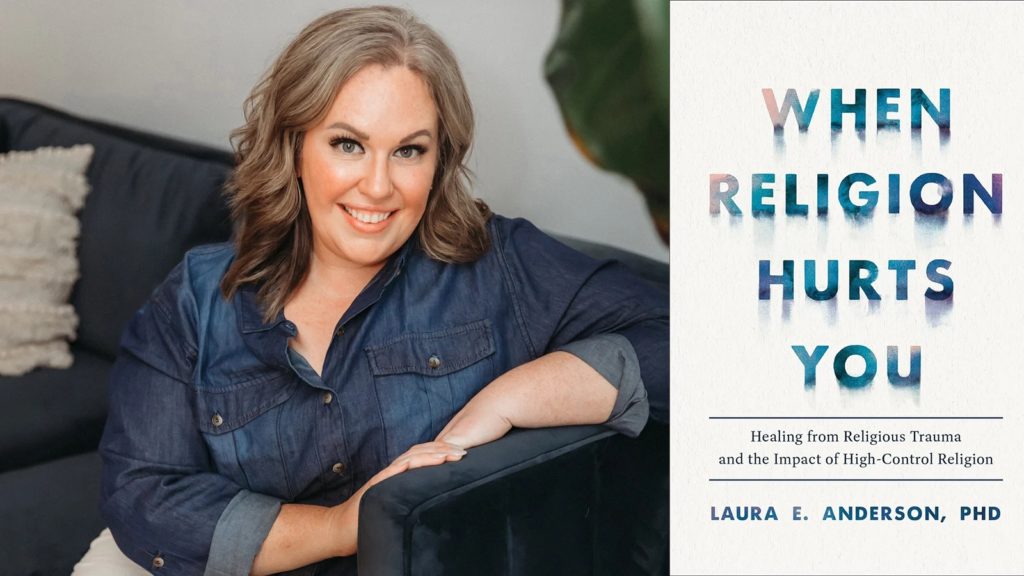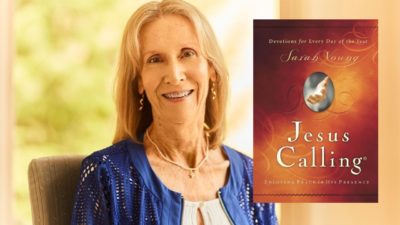Raised in an evangelical church she now describes as a “dumpster fire” of fundamentalist beliefs, Laura Anderson’s terror of hell kept her up at night as a 4-year-old. Her insomnia was less about hell itself and more about the fear of being separated from her family if Jesus came back. So she’d lie awake, picturing an image of Jesus dying on the cross, hoping it would guarantee salvation.
Decades later, long after her sleeping patterns had regulated, she suddenly suffered from severe insomnia again — this time after she’d come to reject the idea of hell.
“Because of the way I had embodied those messages about the consequences of going to hell, my body started to panic again, because I didn’t have this assurance of salvation,” Anderson explained to media. Her fears were still ingrained in her body.
At the time, Anderson thought she was alone in experiencing a trauma response to her religious upbringing. But now, as a psychotherapist who specializes in religious trauma, she knows that’s not the case. In her new book “When Religion Hurts You: Healing from Religious Trauma and the Impact of High-Control Religion,” Anderson gives language for and insights about this under-researched form of trauma and invites readers to take part in the ongoing process of healing.
In an interview, Anderson spoke about purity culture, why atheism isn’t a remedy for religious trauma and how to identify high-control religions. This interview has been edited for length and clarity.
Your tax-deductible gift helps our journalists report the truth and hold Christian leaders and organizations accountable. Give a gift of $30 or more to The Roys Report this month, and you will receive a copy of “Hurt and Healed by the Church” by Ryan George. To donate, click here.
What do you mean when you say religious trauma is trauma?
Prior to the last five, maybe 10 years, most dialogue around religious trauma in professional spaces suggested that to heal from it, you just needed to become an atheist. And for a myriad of reasons, I disagree with that. It can turn into fundamentalism very quickly, just on the other side of the spectrum. Also, that cognitive shift to atheism doesn’t address how trauma is embodied, how those messages, practices and lifestyles live inside of us even after we believe new things.
Research and clinical interventions show us trauma is a physiological state that is happening in our bodies. It is the result of anything that’s too much, too fast, too soon, that overwhelms our ability to cope. So when we understand religious trauma as trauma, it gives us a wealth of resources and interventions. It also helps to validate the actual lived experience. Many of my clients have experienced shame and confusion over having psychological responses even after they don’t believe the same things anymore.
Understanding religious trauma helps us wrap our minds around what’s happening in our bodies and then opens the door for compassion toward yourself and healing in a deeper, more embodied way.
Why might it be important for therapists working with religious trauma not to be anti-religion?
Anti-religious messages can quickly become prescriptive and fundamentalist. To say all religion is terrible and you just have to get rid of it, or the idea that God is dumb and only for mentally weak people, is incredibly shaming and discouraging. It’s also not necessarily helpful for the healing process. My job as a therapist is not to get you to a belief that I might hold. It is to help you heal and to lean in more to who you are authentically. I think that includes religion or spiritual practices. Now I always say I’m not anti-religion, but I am anti-harm and power and control, and anti-abuse. So if you can find a religion or faith or spiritual practice that isn’t including those things, I think that’s wonderful.
What’s the difference between religious abuse and religious trauma?
Trauma is not the thing that happens to you, it’s the result of how your nervous system responds to the thing that happens to you. Trauma is very subjective. And that means no event or single doctrine is inherently traumatic. Think of a car accident. Some people might walk away from it being deeply traumatized, and other people don’t.
Abuse is the thing that happens to you. It doesn’t necessarily mean that if you’re abused, you will absolutely have trauma, though there’s a higher likelihood of it, especially if it’s repeated or inescapable, as we often see in the context of high-control religions.
It’s also important to note that even if the abuse you experienced inside religion did not result in trauma or a diagnosis such as PTSD or CPTSD, that doesn’t mean you didn’t suffer severe consequences from it. It just means that your body did not store it as trauma.
How can we identify when a religion is a high-control religion?
In the back of the book, I talk about what I call the religious power and control wheel. There’s a diagram, and you’ll see categories like isolation; minimizing, denying and blaming; spiritual abuse; economic control; defining gender and sexuality rigidly. What’s important to recognize about high-control religion is that it’s never just one thing. It’s these seemingly benign or small things that are compounded, that are consistent and persistent, and oftentimes have severe consequences attached. And then with religious trauma, if you defy the rules they set, then you are defying God. And if you’re defying God, the likelihood of eternal conscious torment, for example, is quite high.
You can also ask: What happens when somebody leaves? What happens when somebody expresses disagreement? What happens when somebody shows up as themselves in a way that might be different than how the group defines what is OK or normal? How are they treated?
What do you mean when you talk about healing as something that’s ongoing?
There is a lot of research that talks about healing as symptom reduction or alleviation. As I was doing my own research for my doctoral dissertation, I had this idea that healing from all these things that happened to me would look a particular way. And it didn’t. In fact, in many cases, it felt like I was getting further and further away, which meant my shame was increasing exponentially. So my dissertation chair told me, I just think you might have a really limited definition of healing. Through research, what I discovered is that when we allow ourselves to consider that healing doesn’t have a finish line, it allows us to be present in our day-to-day life. It let me have more compassion for myself, tune into my body and figure out what I needed.
Why do you call purity culture a form of sexual abuse?
One of the definitions of abuse is the improper use of something for its intended purpose. Purity culture targets our gender, our sexuality, our relationships and our bodies, in terms of what is allowable. It sends us messages about being disgusting, that inherent urges or desires or sensations within us are evil. It takes our sexuality and it twists it and puts rules around it for control. I’m very careful to say that I don’t consider it sexual assault because that is a physical act committed on another person. That said, the long-term impact of purity culture oftentimes shows up very similarly to how a victim of sexualized violence and assault experiences symptoms.
Why is there so little research on religious trauma?
Most research that has been done is around extreme versions of religious trauma involving cults, clergy sexual abuse, things like that. Also, a lot of research suggests religion provides a sense of identity, purpose, belonging and worth, and certainly it can. But on top of that, we have a country that believes it was founded as a Christian nation. So research on religious abuse is not necessarily easy to fund or wildly promoted.
Now, in the last decade or so, there are people starting to research it anyway. But up until 2015, 2016, there just wasn’t a lot of public discourse about it. People were experiencing things in isolation. With social media, that’s changed. And there is research currently being done. The Religious Trauma Institute, which I co-founded, has a collaborative research group. There are many people tackling religious trauma from a variety of angles. It’s just a matter of jumping through all the hoops and getting them into journals.
 Kathryn Post is a reporter for Religion News Service based in Pittsburgh, Pennsylvania.
Kathryn Post is a reporter for Religion News Service based in Pittsburgh, Pennsylvania.




















26 Responses
Those evangelicals and fundamentalists who believe in the infallibility and inerrancy of the Bible often mistakenly impute infallibility and inerrancy to their own interpretations, theology, and opinions. Likewise, those believe in the authority of the Bible often impute that authority to themselves as those who are in possession of the truth and incapable of lying. They feel it’s their duty to impose their beliefs on others by control and threats. I came to this conclusion after reading Sissela Bok’s book “Lying”, pages 6, 7.
Amen, Sister! Old dude here well into my ninth decade of life and just figuring out why I’ve lived all those years in self abasement, self critique, shame, guilt, etc. etc. etc. My family of origin was run based on guilt and shame issuing out of a pietistic, fire and brimstone, performance based approach to theology. I’ll never throw rocks at them or the generations that came before them. They did what they knew how to do and didn’t know what they didn’t know. But the one step that is essential to moving beyond that damage is acknowledging what happened without blame and retribution and then move on. It can be a very tough thing to process without blame, conflict, etc. I’m of the opinion that many coming out of your scenario can see precisely what has happened to them, but the cost of stepping into the challenges of change are too high so they don’t take that step. The cost of doing something seems too high. Usually unrecognized is the greater cost of doing nothing. That cost is never as visible as the cost of doing something and it often doesn’t come due until later in life. Sadly, many who need to hear your message have their ears stopped up. You keep talkin’ anyway! Thank you!!
Daniel and Frederic. Thank you thank you thank you.
The aspect of religion that can “harm”, that most affects me (personally and intellectually), is what I might term hermetic containment (so something that can be at the other end of the spectrum to “high control religion”, but otherwise playing out across embodiment as Laura suggests).
Christian authors and theologians and apologists have spent over two millennia developing an all encompassing understanding that often mapped with all in which collective life subsists. Such that internalising all or some significant part of a resultant Christian hermetic, was pretty unavoidable.
Where harm then resulted and results, is where and when and how containment by that hermetic, interfered with individuals working out and expressing what they were and are authentically.
A complex existential problem arising where and when the individual did not absolutely reject the hermetic, but required crucial adjustment to it to mediate authenticity for themselves.
In such an individual circumstance, you can get locked into lostness as you negotiate the complexity of the well-engineered received hermetic. Your compass tells you must work through the hermetic to win to your mediating differing hermetic, but you are threatened always by resource exhaustion, because of how well engineered the received hermetic is.
Here your relation to others likely kicks in. As they may embody the received hermetic that is preventing you winning to authentic agency. You don’t want to reject them and their believing and faith, but you need to parse that with your expression of your self-mediating impulse. It becomes hard. It risking harming.
Jesus talked a lot about Hell, and so did Paul, not to mention the way Revelation ends the biblical story. Not every judgement and bad news comes from the devil, and not every encouragement comes from the Spirit of God. I appreciate the articole on religious trauma. I am afraid, however, not to play into the hands of „cultural Christianity”, where no one can judge anyone (which is not what Jesus meant when He said „judge not, lest you be judged”) and countries like England and Germany did prosecute people who spoke about Hell to highschoolers in a normal way, but evidently „traumatizing” them in the eyes of the authorities.
If we rely on the Jewish understanding of “Hell” (which would seem reasonable as both Jesus and Saul/Paul were or began as Jews), then the relation of Jesus (as portrayed by the NT) and Saul/Paul (as NT portrayed), would seem to have to be very different. The cleansing of the soul our portrayed Jesus might routinely go through, would seem to have to be very different from the soul cleansing the murderer/persecutor Saul/Paul would have to unremittingly and continuously go through. It is arguable that Paul’s ministry is an extreme example of Hell process.
Christianity then does seem to have morphed the Jewish conception to a Christian conception of Hell. In many ways these Christian conceptions of Hell are the more terrifying.
We have to then place the terror inside the being of the committed Christian. That Christian then entering into intersubjectivity with UK or German minors. We there have a problem; arguably a child protection issue.
All religions are contentious. All religious beliefs and faiths are contentious. Christian conceptions and embodied experiences of Hell, are thereby contentious. What Christians are fearful of, is contentious.
That contention then bleeds into what we variously want our children to be exposed to. A sizeable constituency do not want their children to be exposed to the conceptions and fears of Christianity, and perhaps any religion or ideology. Instead let children find out things for themselves, come to such things when ready and personally relevant.
Jesus did talk about “Hell” and if He is the Son of God, then we have to contend with this issue. I do not like it, but whatever “IT” is, it will not be a pleasant place. Also, there are various Greek and Hebrew words used that add nuance to the Afterlife. It is a hotly debated subject. Now, if you want to say the OT prophets, Jesus, Peter, Paul and John got it wrong, that is a whole other problem.
Vance. The idea of the ‘afterlife’ doesn’t figure much for me. I prefer to view things in the context of mortal life on the Earth. So I think of heaven and hell in terms of aspects of our lives on Earth. Not thereby shorne of significance or force.
Jesus as the son of God, I understand as Jesus being righteous in his time of life on Earth. Again, no loss of significance or force.
There are many issues attaching to the idea that we know what Jesus said, did and believed. What we have are reports by others, sometimes much after events, as to what is claimed he said, did and believed. We cannot be certain that particular gospels were written by single authors.
Peter again, we only know through hearsay reporting; certainly as I understand it.
John I like, apart from Revelations (which seems to me too mystical, even psychotic).
Paul is the sticking point for me. I don’t buy into the mythologising of Saul/Paul. I measure him against the schisms that his diatribes yield up. I judge Christianity is harming itself across divisions between those alternately supportive of or opposing the theses Paul apparently put forward. I don’t think he would have had anything to do with me, and I suspect he would so put my back up that we could not proceed together. Wrong, not necessarily; more nuanced than that. But as a human package, Paul may not have been able to squeeze his biographical and psychological baggage through the needle’s eye of relating to and reaching all human beings. Something of a man in a living Hell, striving furiously to secure his place in a Heaven; so not for everyone.
I spent many years of my life fearful of hell. In fact I still am fearful of hell. That is ok. God has provided an infinitely strong salvation in Jesus. All we have to do is look to Him and be saved. For many years I was convinced I was an apostate and doomed to hell. I was angry at God and blamed him for being cruel and a grace miser. I bemoaned him as capricious, saving the few elect and damning the many for His glory. Two years ago God woke me up again to His Presence in my life. I realized that even my sins were forgiven and that there was room at the cross for me. God has no pleasure in the death of the wicked (Ezekiel 18: 23). Jesus died for “the many” not merely a few (Matt. 26: 28). God desires all people to be saved (I Tim 2: 4).
This does not negate the alternative that Jesus said in Matthew 7:13-14 that the gate to eternal life is narrow and it is only the minority of people who find it.
In summary, rather than trying to change what God has said about hell, it is better to urge people to enter through the narrow gate, and take great heart that Jesus died for the many. If Jesus died for the many why not you? Place your trust in Jesus and be saved.
That’s odd. I thought the purity movement was about saving sex for marriage.
The goal of the purity movement appeared to be about saving sex for marriage. However, the methodology employed to accomplish that aim created very rigid gender stereotypes and legalistic rules around male/female relationships, courtship, etc.
If you either chose not to follow the purity rules or your boundaries were violated, you were deemed “unpure” and compared to objects like trash or a chewed up piece of gum. This methodology catastrophized one poor choice or one moment of weakness. Even worse, it heaped shame and guilt on sexual assault victims over something that should have been responded to with kindness and compassion.
One resource that provides a good look at some of the problems with the purity movement is a documentary called “I Survived I Kissed Dating Goodbye” which is available on YouTube.
“And that means no event or single doctrine is inherently traumatic”. That is concerning. These are examples are listed that have zero biblical basis
“categories like isolation; minimizing, denying and blaming; spiritual abuse; economic control; defining gender and sexuality rigidly. What’s important to recognize about high-control religion is that it’s never just one thing. It’s these seemingly benign or small things that are compounded, that are consistent and persistent, and oftentimes have severe consequences attached.” Paul said something different. “Do not be deceived: neither the sexually immoral, nor idolaters, nor adulterers, nor men who practice homosexuality, nor thieves, nor the greedy, nor drunkards, nor revilers, nor swindlers will inherit the kingdom of God. And such were some of you. But you were washed, you were sanctified, you were justified in the name of the Lord Jesus Christ and by the Spirit of our God.” This article is disturbing because it redefines biblical values that mead little interpretation. In fact the BIBLE holds authority not our trauma. Pragmatic approaches are It knowing I’ve been washed and sanctified. Philippians 1:6, James1:2-8 ad Hebrews 12:-1-3.
“What’s important to recognize about high-control religion is that it’s never just one thing. It’s these seemingly benign or small things that are compounded, that are consistent and persistent, and oftentimes have severe consequences attached.” [Laura A]
“Paul said something different.” [James P].
The understanding and conception offered respectively by Laura and Paul, do differ, because they are respectively focusing on the Paul-intended good-outcome, and the unintended Laura recognised collateral concerning outcome.
Paul is arguably the the Biblical exemplar of the high-control Christian religion which Laura critiques with regards to its concerning collateral outcomes.
It is then possible to recognise degrees of validity in the respective approaches of Paul and Laura. But their approaches do not meet or coalesce comfortably. So “disturbing”, as you say.
Paul’s understanding on any “one thing” (such as those he and you cite), has no direct connection to what Laura is understanding as “no one thing”. Rather Paul has his driven project in mind, and speaks directly to that; hence the power in what he has to say. Laura speaks to something which Paul’s driven concern sees him leaving out, or perhaps not even recognising. We should not here forget that Laura is a woman speaking out of a time of much empowerment for women (where the hermetic she relies on has been much authored and developed by women), and Paul is a man speaking out of a time which was overwhelmingly patriarchal.
“Paul is arguably the the Biblical exemplar of the high-control Christian religion which Laura critiques with regards to its concerning collateral outcomes.”. Ummm… Paul referred to himself the “Chief of Sinners” “afraid of being disqualified” “least of the apostles”. Prior to coming to Christ you might have a case. By his deportment towards Stephen and actions towards the early church.
At the end of his life and ministry only Luke was with him. He was begging for a blanky from his protégé Timothy. Not picturesque of a controlling person.
I’m not coalescing their views or pragmatics. The disturbance is the lack of biblical objectivity. That does not mean her subjective experience is not valid. However the basis of her trauma is biblically disturbing. I find her perspective and The Religious Trauma Institute as unbiblical. Spent time researching their organization. My perspective is not authoritative but informative. I’m responsible for my biblical hermeneutics and the hermeneutic I view life. I disagree. I would be happy to discuss. Disagreement does not equate hate but prayer for clarity on both perspectives.
James are you disturbed because the perspective is coming from a woman?
Not at all. I am disturbed but the information is not biblical. In fact, Spiritual gifts are not gender specific. My concern is not the “who” but the “what”. I will not be pulled into that argument to deter my concerns
Insinuating bad motives is an underhanded tactic.
Paul wrote that “the law is good if one uses it lawfully.”
The same Paul wrote that “the letter kills, but the spirit gives life.”
He also wrote that the fruit of the spirit is “love, joy, peace, kindness,…”
It’s fair to say that these fruits are not what the author of this article experienced in her religious community. Maybe there’s a whole approach that needs to be reevaluated.
Paul is being rhetorical. The law cannot be used lawfully. It is not intended for that, Even in the Old Testament. The law is void for those in Christ. All the promises of God did their “yes in Him”. Christ did not abolish the law, but fulfilled it. Followers of Christ have been crucified with Him. So they have fulfilled the law. Thereby under grace. Grace actually has a higher level of accountability. Jesus said, “everything written about ME in the Law of Moses and the Prophets and the Psalms must be fulfilled.” Then HE opened their minds to understand the Scriptures”. Point is when you see the law from a Christocentric Hermeneutic, your mind will understand the Scriptures. Reevaluation? Christ has evaluated it perfectly. Because He is perfect. Maybe it is fair to say the author was not in a Christocentric church.
What if she is right and there is no Hell?
No hell? Are we saved from hell or sin. Neither. We are saved from the Holy & Just wrath of/from God. Hell is the actual punishment for those who want “compassion toward yourself”. Sorry that is going through the wide gate. The narrow gate is Christ’s gate We must deny ourselves pick up our cross/trauma daily and follow Christ. We have become weak via the pursuit of self. I have profound issues with my military service. Compassion is a cheap substitute for Christ as my identity. The root of the authors doctrine is heretical & deadly. It has nothing to do with gender. I’m not hating. I am disturbed by the content not the individual. Period.
“Compassion is a cheap substitute for Christ as my identity.”
That may be true for you. But does it say anything about Laura and her human agency.
By committing to the tradition and practice of therapy. Laura commits to outcome in the here and now of Earthly life. That commitment works through the vehicle of self: the self of Laura; the self of the client.
Why can’t we allow equivalent significance to your path and that of Laura. Why can’t we view yourself and Laura as demonstrating two ways of being human; even if a degree of disturbance attaches to the experiential relation between the two human beings involved.
Read the context. Even your second response. It’s not rooted in scripture. These stated truths by the author are antithetical to the gospel. Period. Compassion in the context of church trama and not affirming biblical truth. It is interesting when people contextualize the Bible to fit a narrative and then do the same to my statements. The goal of subjectivism is reframing objective truth to fit a narrative or belief. Using their constructs to regulate truth. Even your argument of Jewish perspective on he’ll minimizes a lot of biblical doctrine. This is not meant to be insulting. But how much Bible do you read? Do you feed yourself daily? Do you throw down your presuppositions when reading?
“Why can’t we allow equivalent significance to your path and that of Laura.”
Because truth matters. Christianity isn’t some feel good religious trip, it’s about telling the truth about the way the world really is. Saying that one person can believe hell exists and another can deny it, and that both can be legitimate is logical nonsense.
“The root of the authors doctrine is heretical & deadly.”
Heretical possibly. In as much as it offers an understanding of self and life-on-Earth, that differs in emphasis from an orthodox theology some derive from the Bible (where what death is an arguable portal to, takes priority, and that symbolised in an understanding of Jesus as Christ).
Deadly, no. Psychotherapy is life affirming. The difference being between what is prioritised as in-life and alternately after-life.
I’ve always taken Jesus to rather exemplify the wonder of self. The wonder of what integrity and authenticity of self can bring about.
I think that sense of Jesus is validated by other’s being moved to following Jesus. Where to relate to others and communicate with and to others, you have to work through your self, and the other’s self has to be engaged by your self.
Just a thought and a question? Christ said, He is the WAY atheism TRUTH the LIFE and NO man comes to the Father BUT by Me. If something is heretical then it is deadly. If doctrine is sound. As Paul states. Literally sound means healthy or life-giving . Heresy from a logical perspective is deadly. That’s why not many should be teachers. Dangerous when you lead people astray. It’s all over scripture. Not my word. So is heresy by biblical standards deadly?